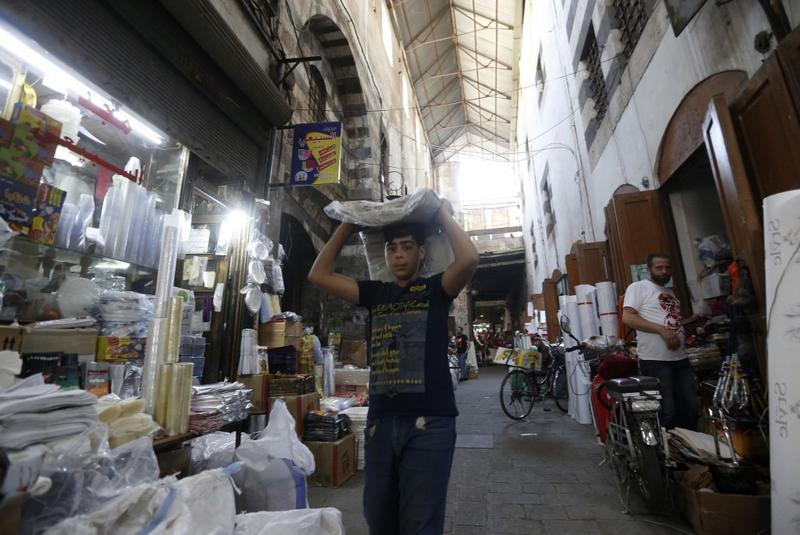 A Syrian boy carrying textiles is pictured in the bazaar in old Damascus, on June 16, 2020. (LOUAI BESHARA / AFP)
A Syrian boy carrying textiles is pictured in the bazaar in old Damascus, on June 16, 2020. (LOUAI BESHARA / AFP)
GENEVA - Syria faces an unprecedented hunger crisis with over 9.3 million people lacking adequate food while the country’s coronavirus outbreak, though apparently controlled for now, could still accelerate, UN aid agencies said on Friday.
The World Food Programme (WFP) told a briefing in Geneva that the number of people short of essential foodstuffs had risen by 1.4 million in the past six months
The World Food Programme (WFP) told a briefing in Geneva that the number of people short of essential foodstuffs had risen by 1.4 million in the past six months.
Food prices had also soared by more than 200 percent in less than a year due to the freefall in neighbouring Lebanon’s economy and COVID-19 lockdown measures in Syria, WFP spokeswoman Elisabeth Byrs said.
After nine years of armed conflict, more than 90 percent of Syria’s population lives under the US$2 per day poverty line and humanitarian needs are growing, Akjemal Magtymova, the World Health Organization (WHO) Representative in Syria, told a separate briefing.
Fewer than half of Syria’s public hospitals are functional, while half of the medical workforce has fled since the conflict began, she said, with those remaining facing a “pervasive threat of kidnapping and targeted killings”.
ALSO READ: China envoy calls for lifting of unilateral measures against Syria
Authorities have reported 248 coronavirus infections, including 9 deaths in government-held areas, while a further 5 cases and one death have been recorded by the Kurdish-led administration in the northeast, WHO figures show.
“The official numbers represent a likely underestimate of the true numbers, and that’s not unique to Syria at all,” said Richard Brennan, WHO’s regional emergency director.
After a slow start, COVID-19 outbreaks in Iraq, Egypt and Turkey accelerated and the same is expected in Syria, he said.
“What we do know in Syria is you don’t have an explosive outbreak, you can’t cover up, you can’t miss an explosive outbreak. The health facilities are not overwhelmed, so this is why we still have an opportunity to scale up our preparedness to blunt and mitigate the worst of the outbreak,” Brennan said.
READ MORE: Fears grow of spread as Syria confirms first virus case
No infections have been reported in the rebel-held northwest, he said. But the heavily-populated region only has one functional laboratory and the risk of the new coronavirus spreading rapidly is high, he added.


